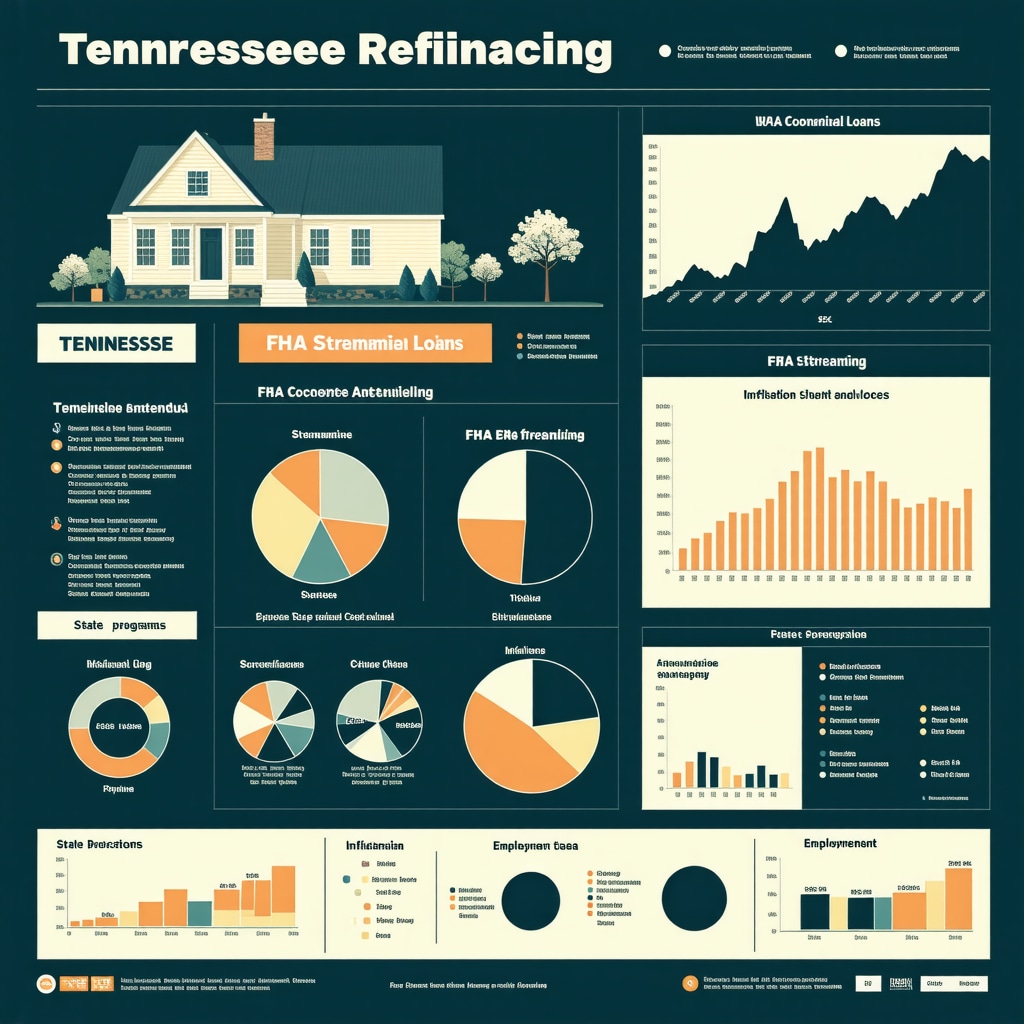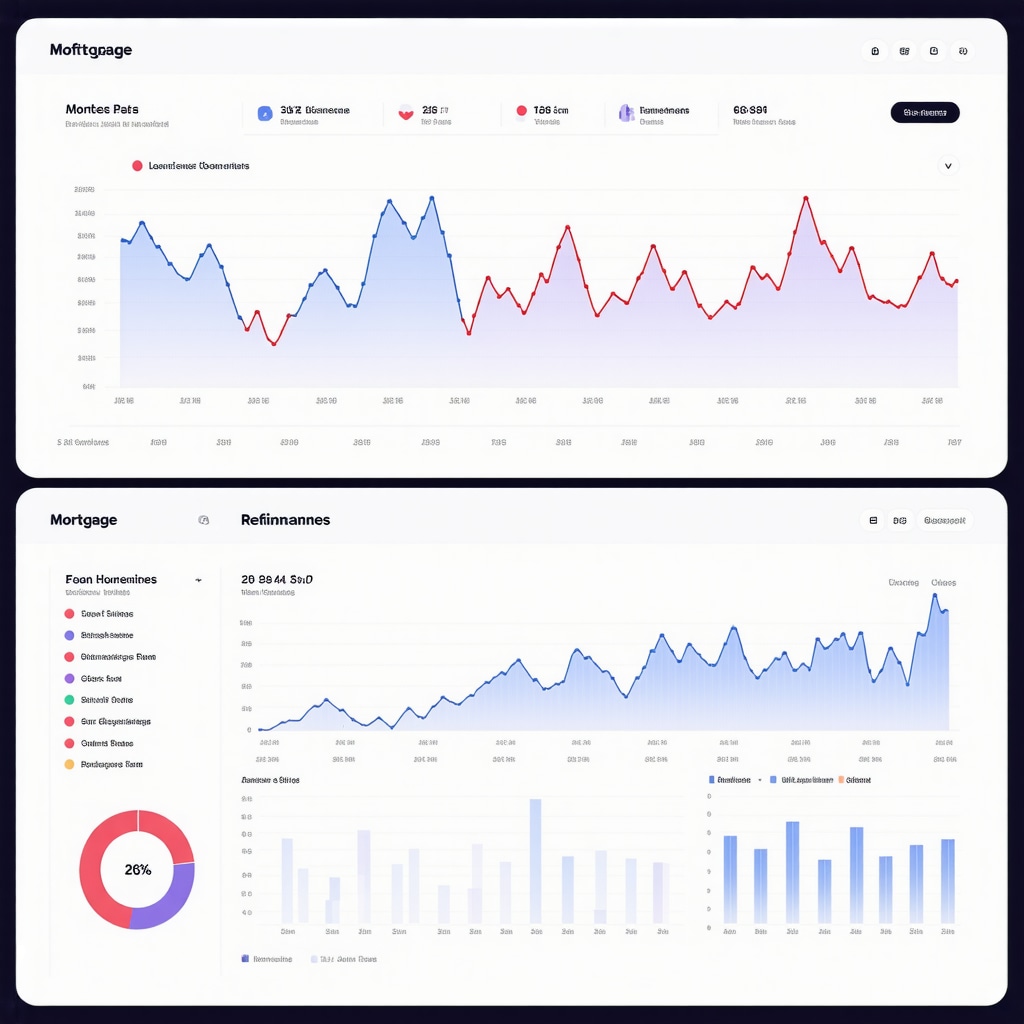Unlocking the Ideal Moment: Refinancing Your Tennessee Home in 2025
Refinancing a home loan can feel like navigating a complex maze, especially in Tennessee’s dynamic mortgage market of 2025. Whether you’re aiming to reduce monthly payments, shorten your loan term, or tap into your home’s equity, timing is everything. But how do you know when the stars align for refinancing? Let’s explore expert insights and practical tips to pinpoint the best time to refinance your Tennessee home this year.
Decoding Tennessee’s Mortgage Rates: Why Timing Matters More Than Ever
The Tennessee mortgage landscape in 2025 is marked by fluctuating interest rates influenced by broader economic trends and local market conditions. According to the Federal Reserve’s Monetary Policy updates, small shifts in benchmark rates can dramatically affect your refinancing potential. Locking in a rate when Tennessee refinance rates dip can save thousands over the loan’s lifetime. For example, homebuyers in Nashville who refinanced during early 2025 witnessed notable monthly savings due to favorable fixed-rate offers.
Creative Strategies: When Should Tennessee Homeowners Consider Refinancing?
Refinancing isn’t just about chasing the lowest rate; it’s about aligning your financial goals with market opportunities. Key moments to consider include:
- When interest rates drop by at least 0.5% to 1% from your current rate, making monthly payments significantly cheaper.
- If your credit score improves substantially, unlocking better loan terms and lower rates. Learn how credit scores impact Tennessee mortgage interest rates to leverage this advantage.
- To switch from an adjustable-rate mortgage (ARM) to a fixed-rate mortgage for more predictable payments. Explore the nuances in our expert guide on fixed vs adjustable mortgage rates.
- When you want to tap into home equity for renovations or debt consolidation, but only if the refinancing costs won’t outweigh the benefits.
How Often Should Tennessee Homeowners Monitor Mortgage Rates for Refinancing Opportunities?
Given the volatility of mortgage rates, especially in 2025, it’s prudent to monitor rates at least monthly and stay informed about economic indicators that influence them. Many lenders offer rate alerts tailored for Tennessee residents, enabling timely decisions. However, avoid rate-chasing that leads to frequent refinancing — each process involves closing costs that can negate savings.
Real-World Experience: A Middle Tennessee Family’s Refinancing Journey
Consider the Smith family from Knoxville, who refinanced their mortgage in April 2025. After their credit score improved by 40 points following diligent financial management, they locked in a fixed-rate mortgage 1.2% lower than their original loan. This strategic timing saved them nearly $300 monthly, freeing funds for their children’s education. Their experience underscores the synergy between market timing and personal financial health in successful refinancing.
Expert Tips to Maximize Your Tennessee Refinancing Benefits in 2025
To optimize your refinancing efforts, experts recommend:
- Consulting local Tennessee mortgage brokers who understand regional market nuances and can guide you through tailored options (find trusted local mortgage brokers here).
- Reviewing your credit report regularly and addressing discrepancies to qualify for lower rates.
- Calculating the breakeven point for refinancing to ensure that the upfront costs are justified by future savings.
- Considering loan terms carefully — shorter terms may offer savings despite higher monthly payments.
Refinancing your Tennessee home at the right moment requires a blend of market awareness, financial readiness, and strategic planning. For a deeper dive into refinancing strategies and when to lock your rates in 2025, explore our dedicated resource on 2025 refinance rates in Tennessee.
Curious about how these expert tips can apply to your unique situation? Reach out to our Tennessee mortgage specialists for personalized advice and start your refinancing journey confidently.
When Life Changes, Should Your Mortgage Change Too?
Reflecting on my own refinancing journey, I realized it’s not just about rates but life phases. When my job shifted, and my family grew, the financial priorities evolved. Refinancing became a tool to align my mortgage with these new needs—whether to lower payments during tight times or to shorten the term when stability returned. Have you ever thought about how your personal milestones could signal the right moment to refinance? It’s a question worth pondering as market rates fluctuate.
What’s Your Refinancing Story? How Do Personal Goals Shape Your Mortgage Decisions?
Many homeowners overlook how personal aspirations influence mortgage choices. Are you planning renovations, aiming to pay off debt, or thinking about investment properties? For instance, tapping into home equity for renovations can be a smart move if the math works out, just like the Smith family in Knoxville found out. They carefully calculated their breakeven point before committing, ensuring the savings outweighed the costs.
In 2025, Tennessee’s mortgage environment offers diverse options—fixed, adjustable, jumbo loans, FHA loans—all with nuances worth exploring. For a deep dive on these topics, resources like inside Tennessee’s FHA loan rates provide valuable insights tailored for local buyers.
One surprising lesson I learned was the impact of credit scores. Improving your score even by a few points can unlock better rates and terms, saving thousands over time. The relationship between credit health and mortgage offers is well documented, including by trusted sources like Consumer Financial Protection Bureau, which emphasizes credit monitoring as a vital step before refinancing.
Personalizing Your Refinancing Approach: Tips From Real Tennessee Homeowners
Talking with friends and neighbors, I found many benefited from local mortgage brokers who know Tennessee’s unique market dynamics. Their expertise helped identify lenders offering competitive rates and guided them through the often overwhelming application process. If you’re exploring this path, consider trusted local mortgage brokers in Tennessee to get personalized support.
Moreover, understanding the timing of locking rates is crucial. Some homeowners lock early to avoid upward shifts, while others monitor for dips. It’s a delicate balance; premature locking might forgo better deals, while waiting too long risks rate hikes. I personally found setting up rate alerts and consulting experts invaluable in making timely decisions.
How Can You Stay Ahead in Tennessee’s Dynamic Mortgage Market?
Staying informed is your best strategy. Subscribe to newsletters, use mortgage rate comparison tools, and engage with community forums sharing real-time experiences. These actions helped me remain proactive rather than reactive.
Are you navigating the refinancing maze alone or with expert help? Share your experiences below or ask questions—your story might inspire others. And if you want to explore related topics, check out our guide on refinancing strategies in Tennessee to sharpen your approach.
Unlocking the Hidden Nuances: Leveraging Tennessee’s Refinancing Programs Beyond Traditional Loans
While conventional refinancing options often dominate conversations, Tennessee homeowners in 2025 have access to a growing suite of specialized programs tailored to unique financial situations. For example, the state’s Homeownership for All initiative offers targeted refinancing avenues for low-to-moderate income borrowers, enabling access to competitive rates paired with flexible underwriting criteria. Additionally, FHA Streamline Refinance options can significantly expedite the process for qualifying homeowners by reducing documentation requirements, especially when credit and income verification pose challenges. Understanding these alternatives requires thorough research and consultation with mortgage professionals well-versed in Tennessee’s local lending landscape.
Moreover, state-specific programs like the Tennessee Housing Development Agency’s (THDA) Mortgage Credit Certificate (MCC) can sometimes be combined with refinancing strategies to maximize tax credits and reduce overall borrowing costs. Savvy homeowners can thus create multifaceted refinancing approaches that go beyond simply chasing lower interest rates, effectively optimizing their long-term financial positions.
Could Utilizing Tennessee’s Specialized Refinancing Programs Offset Higher Closing Costs?
It’s a sophisticated balancing act. While specialized refinancing options may feature higher upfront closing costs or stricter eligibility criteria, the long-term benefits often outweigh these initial expenses. For example, refinancing through an FHA Streamline program might carry slightly elevated fees but can eliminate the need for extensive underwriting, appraisal, and credit checks, streamlining the process and reducing uncertainty. The key is conducting a detailed cost-benefit analysis factoring in your projected time in the home, anticipated savings, and tax implications.
Consulting with licensed Tennessee mortgage brokers who have direct experience with these programs is invaluable. They can provide tailored projections and help homeowners navigate eligibility nuances, ensuring that refinancing decisions are both informed and strategically sound.
Integrating Advanced Financial Modeling: Forecasting the Impact of Refinancing on Tennessee Homeowners’ Wealth
Beyond immediate monthly savings, refinancing decisions profoundly influence long-term wealth accumulation. Employing financial modeling tools that incorporate variables such as interest rates, loan terms, inflation, and personal cash flow can offer homeowners a clearer picture of how refinancing will affect net worth over decades.
For instance, extending a loan term might reduce monthly payments but increase total interest paid, potentially delaying equity building. Alternatively, shortening the mortgage term can accelerate equity growth but may strain monthly budgets. An advanced model can simulate these scenarios under different economic conditions, including Tennessee’s localized housing market trends and projected appreciation rates.
Such granular analysis helps homeowners align refinancing choices with broader financial goals like retirement planning, college funding, or investment diversification. Financial advisors specializing in mortgage strategies are increasingly incorporating these complex models, reflecting a shift toward more holistic mortgage management.
How Can Tennessee Homeowners Effectively Use Financial Forecasting Tools to Decide on Refinancing?
To harness the power of forecasting, start by gathering detailed personal financial data, including current mortgage terms, income projections, expected home appreciation rates, and potential life changes. Utilizing software platforms or working with financial planners who specialize in mortgage analytics can translate this data into actionable insights. Tools like MortgageCalculator.org offer customizable scenarios, but for more precision, Tennessee-specific market data integration is essential.
Ultimately, the goal is to evaluate multiple refinancing paths, their short- and long-term impacts on cash flow, equity, and net worth, and select the option that best harmonizes with personal financial aspirations.
Mastering Timing: Predictive Indicators to Watch in Tennessee’s 2025 Mortgage Market
Seasoned mortgage experts recommend closely monitoring several predictive economic indicators that can presage advantageous refinancing windows. These include:
- Federal Reserve policy announcements: As the primary driver of benchmark interest rates, changes in Fed policy can swiftly affect mortgage rates.
- Local employment and wage growth data: Tennessee’s robust labor market dynamics often influence housing demand and lending risk profiles.
- Inflation trends: Persistent inflation can pressure lenders to increase rates, potentially shortening refinancing opportunities.
- Housing inventory and sales velocity in key Tennessee markets: Rapid sales and low inventory can signal tightening lending conditions.
By synthesizing these data points, homeowners can anticipate rate movements and strategically time refinancing applications, balancing the risk of premature locking against the potential cost of waiting.

Engaging proactively with these complex indicators, and combining them with personalized financial modeling, empowers Tennessee homeowners to transform refinancing from a reactive necessity into a proactive wealth management tool.
Ready to deepen your understanding of Tennessee’s intricate refinancing landscape? Connect with our mortgage experts today for customized analysis and strategic guidance tailored to your unique financial profile.
Harnessing Data Analytics: Unlocking Deeper Refinancing Insights in Tennessee
As the Tennessee mortgage market becomes increasingly complex in 2025, leveraging big data analytics offers homeowners a competitive edge in refinancing decisions. Advanced algorithms analyze historical rate patterns, borrower credit profiles, and localized economic variables to forecast optimal refinancing windows. These predictive models, often employed by institutional lenders and savvy brokers, transform raw data into actionable intelligence, enabling more precise timing and tailored loan product recommendations. Integrating machine learning-driven platforms allows Tennessee homeowners to move beyond conventional heuristics and embrace a data-informed refinancing strategy that aligns tightly with their financial trajectories.
Exploring the Role of Mortgage-Backed Securities in Shaping Tennessee Refinance Rates
Mortgage-backed securities (MBS) markets profoundly influence the mortgage rates offered to Tennessee borrowers. Shifts in investor demand for MBS directly affect lenders’ funding costs, reverberating through the refinancing landscape. Understanding this relationship offers homeowners a macroeconomic lens to interpret rate fluctuations beyond Federal Reserve announcements. For instance, increased MBS demand typically compresses rates, presenting opportune refinancing moments. Conversely, volatility in these markets can signal impending rate adjustments. Engaging with resources like the Wall Street Journal’s MBS market data equips homeowners with nuanced perspectives vital for timing their refinancing maneuvers effectively.
What Advanced Techniques Can Tennessee Homeowners Use to Minimize Refinance Costs While Maximizing Benefits?
Beyond traditional rate shopping, Tennessee homeowners can employ techniques such as “no-closing-cost” refinancing options, which roll closing fees into the loan principal, or negotiate lender credits in exchange for slightly higher interest rates. Additionally, refinancing during periods of lender competition or promotional campaigns can yield reduced fees or streamlined underwriting. Utilizing escrow analysis to anticipate property tax and insurance adjustments post-refinance also prevents unexpected outlays. Engaging with mortgage professionals who utilize scenario modeling and cost-benefit calculators ensures homeowners adopt a holistic approach that balances upfront costs with long-term financial gains.
Leveraging Tennessee’s Localized Economic Indicators for Strategic Refinancing
Delving deeper into Tennessee-specific economic metrics such as regional GDP growth rates, urban migration patterns, and construction permits offers advanced insight into housing demand and lending conditions. For example, rising construction permits in Nashville indicate increased housing supply that could temper mortgage rate hikes, while strong GDP growth in Chattanooga suggests robust borrower creditworthiness, potentially leading to more favorable refinancing terms. Homeowners attuned to these indicators can anticipate market shifts and position their refinancing applications to capitalize on favorable lending climates.
Building Resilience: Refinancing Amidst Tennessee’s Inflationary Pressures
In an environment of persistent inflation, refinancing strategies must incorporate inflation hedging considerations. Fixed-rate refinancing locks in predictable payments, shielding homeowners from rising costs, while adjustable-rate options may become riskier as inflation pressures drive rates upward. Furthermore, integrating mortgage refinancing within a broader portfolio that includes inflation-protected securities or real estate investments can enhance overall financial resilience. Tennessee homeowners should work with financial advisors to tailor refinancing decisions that complement their inflation risk management strategies.
Ready to Elevate Your Tennessee Refinancing Strategy?
Embracing these advanced insights transforms refinancing from a transactional event into a strategic financial milestone. Connect with our expert Tennessee mortgage consultants to access cutting-edge analytics, specialized loan products, and personalized modeling that align with your long-term wealth goals. Start your expert consultation today and unlock the full potential of refinancing in Tennessee’s dynamic 2025 market.

Frequently Asked Questions (FAQ)
What is the best interest rate drop to consider refinancing my Tennessee home?
Experts generally recommend refinancing when interest rates drop by at least 0.5% to 1% below your current mortgage rate. This threshold often ensures meaningful monthly savings that outweigh the costs associated with refinancing.
How does my credit score impact my ability to refinance?
A higher credit score can unlock lower interest rates and better loan terms. Even modest improvements in your credit profile can significantly reduce your refinancing costs and monthly payments in Tennessee’s 2025 mortgage market.
Should I refinance from an adjustable-rate mortgage (ARM) to a fixed-rate mortgage?
Switching from an ARM to a fixed-rate mortgage can provide payment stability and protection against future rate increases, which is particularly valuable amid inflationary pressures and volatile markets.
How often should I monitor mortgage rates if I’m considering refinancing?
Monitoring rates monthly is advisable, along with setting up lender rate alerts. However, avoid frequent refinancing attempts as closing costs can erode benefits; strategic timing is key.
What specialized refinancing programs are available in Tennessee?
Tennessee offers initiatives like the Homeownership for All program and FHA Streamline Refinance, which cater to specific borrower profiles with potentially reduced documentation requirements and competitive rates.
Can refinancing help with tapping into home equity?
Yes, refinancing can enable you to access home equity for renovations or debt consolidation, but it’s critical to calculate if the long-term savings exceed upfront refinancing costs.
How can financial forecasting tools assist my refinancing decision?
These tools model the impact of different refinancing scenarios on your cash flow, equity, and net worth over time, helping align your mortgage strategy with broader financial goals like retirement or education funding.
What economic indicators should I watch to time my refinancing?
Key indicators include Federal Reserve policy changes, local employment trends, inflation rates, and housing market dynamics in Tennessee such as inventory levels and sales velocity.
Are there advanced techniques to minimize refinancing costs?
Techniques include no-closing-cost refinancing, negotiating lender credits, refinancing during promotional periods, and using escrow analysis to anticipate post-refinance expenses.
How do mortgage-backed securities (MBS) markets influence Tennessee refinance rates?
Demand and volatility in MBS markets affect lenders’ funding costs and thus mortgage rates. Understanding these trends can help anticipate rate fluctuations beyond traditional economic announcements.
Trusted External Sources
- Tennessee Housing Development Agency (THDA): Provides authoritative information on state-specific programs like the Mortgage Credit Certificate (MCC) and initiatives supporting low-to-moderate income homeowners, essential for understanding specialized refinancing options in Tennessee.
- Federal Reserve Monetary Policy Reports: Offers detailed insights on benchmark interest rate decisions that directly influence mortgage rates nationwide, including Tennessee, crucial for timing refinancing actions.
- Consumer Financial Protection Bureau (CFPB): A trusted resource on credit score impacts, mortgage disclosures, and borrower protections, helping homeowners make informed refinancing decisions.
- Wall Street Journal – Mortgage-Backed Securities Market Data: Provides up-to-date information on MBS market trends which affect the cost and availability of mortgage financing, valuable for advanced refinancing strategies.
- MortgageCalculator.org: Offers customizable financial modeling tools that assist homeowners in forecasting refinancing impacts and comparing loan scenarios tailored to Tennessee’s market conditions.
Conclusion
Refinancing your Tennessee home in 2025 demands a nuanced understanding of dynamic mortgage rates, personal financial health, and local economic conditions. By monitoring interest rate movements, enhancing your credit profile, leveraging specialized state programs, and employing financial forecasting, you can strategically time your refinancing to maximize savings and long-term wealth. Advanced insights into market indicators and mortgage-backed securities further empower you to navigate this complex landscape with confidence. Whether your goal is to reduce monthly payments, access equity, or stabilize your mortgage terms, a personalized, data-informed approach is essential.
Embrace these expert strategies to transform refinancing from a routine transaction into a cornerstone of your financial planning. Share your refinancing experiences or questions below, and explore our related expert content to deepen your mastery of Tennessee’s mortgage market in 2025.

